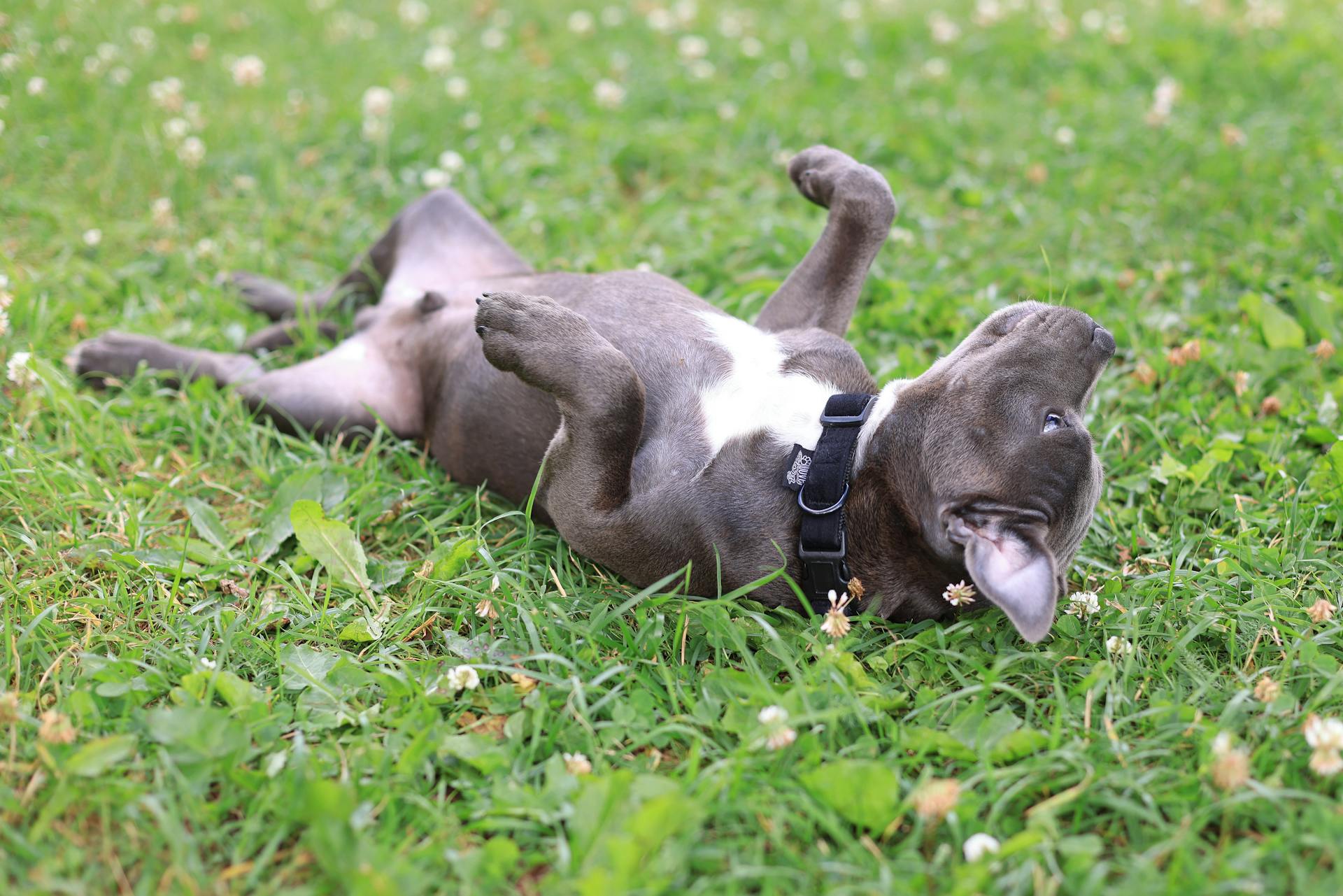
As a Bernedoodle owner, you're likely no stranger to the adorable and playful nature of this breed. However, like any dog, Bernedoodles can develop behavioral problems if not properly trained and socialized.
One common issue Bernedoodles face is separation anxiety, which can lead to destructive behavior when left alone. According to our article, Bernedoodles are prone to separation anxiety due to their strong attachment to their family.
To address this issue, it's essential to provide your Bernedoodle with plenty of exercise and mental stimulation throughout the day. This can include activities like obedience training, agility training, and even simply playing fetch or hide-and-seek.
Consistency is key when training your Bernedoodle, and establishing a routine can help alleviate separation anxiety. By sticking to a schedule and providing a calm and comfortable environment, you can help your Bernedoodle feel more secure when left alone.
If this caught your attention, see: Bernedoodles and Goldendoodles
Understanding the Temperament
Bernedoodles are known to be friendly, loyal, exuberantly happy, and energetic, making them a joy to be around.
Their intelligence is one of their best qualities, but it can also be a challenge if not channeled correctly. They're smart and willing to learn, but they can use that intelligence for negative behaviors if they're not trained correctly.
Engaging training and mental stimulation are crucial to unlocking their full potential and preventing boredom-induced mischief. Without proper training, they might resort to destructive behaviors.
Their strong desire to be with their humans is a characteristic that's hard to beat, but it can also lead to separation anxiety if left alone for too long.
To ensure a well-adjusted Bernedoodle, it's essential to provide them with the right amount of exercise, socialization, and mental stimulation. This will help them thrive and become a loving companion for years to come.
Training and Behavior
Training a Bernedoodle requires consistency and positive reinforcement. They are intelligent dogs that can learn quickly, but they also need to be challenged daily to stimulate their mind.
Bernedoodles can be easy to train, but they also have a strong streak of stubbornness due to their Bernese mountain dog lineage. Proper training and socialization should be started in puppyhood to help them grow out of their puppy rebelliousness.
Positive training methods like clicker training paired with tasty treat rewards will help you get the best results from your Bernedoodle. Start obedience training using positive reinforcement from a young age so your puppy can grow into an adult dog who knows the rules and gets along great with people and other pets.
Bernedoodles that don't get enough mental stimulation may resort to negative behaviors like becoming destructive or barking. They require a few hours of exercise, both physical and mental, per day to stay happy and healthy.
Characteristics of the
The Bernedoodle is a breed that's known for its affectionate and friendly personality. They make great family pets because they can get along well with children and other pets.
Bernedoodles are generally quiet, moderate barkers and will only bark loudly when they need to. This means they won't bark constantly or yap at every little thing they see. They're not prone to excessive barking, but they will alert you to potential threats.
A Bernedoodle's temperamental and physical traits are highly variable, so it's essential to socialize them properly from puppyhood. This will help them get along with children and other animals.
Here are some key characteristics of the Bernedoodle breed:
Bernedoodles are highly intelligent dogs that require regular mental stimulation to prevent destructive behavior. They need to be challenged daily, and learning obedience or tricks can help provide that stimulation.
Choosing the Right Dog
Choosing the right dog is crucial for a harmonious household. Assess your lifestyle and preferences to determine the right size and energy level for your new furry friend.
Each size of Bernedoodle has a distinct temperament and character, so it's essential to choose the right one for your lifestyle. The American Kennel Club categorizes Bernedoodles into three sizes: standard, miniature, and tiny.
Consider your living situation and daily routine to decide which size Bernedoodle is best for you. Standard Bernedoodles are likely to require more space and exercise than miniature or tiny Bernedoodles.
Their energy levels will also vary, so make sure you're prepared to provide the necessary physical and mental stimulation for your new dog.
Health and Care
Bernedoodles need regular exercise to stay happy and healthy. They require at least two long walks per day and some playtime out in the yard with their toys.
Their high energy levels can lead to anxiety if left alone for too long, so it's essential to spend quality time with them. They should never spend more than 8 hours home alone.
A balanced diet is crucial for their overall health. Give your bernedoodle a diet of high-quality wet or dry food split into two or three meals a day.
Regular grooming is necessary to prevent matting and tangling, especially if their coat is very curly. Brush your bernedoodle a few times a week to keep their coat looking its best.
Additional reading: Bernedoodle Coat Types
What Is the History of?

The bernedoodle's history dates back to 2003 when breeder Sherry Rupke first created the breed in Canada. She crossed a Bernese mountain dog with a standard poodle to create this unique mix.
The Bernese mountain dog's gentle nature and the standard poodle's intelligent and loyal attitude are the foundation of the bernedoodle's affectionate personality. This combination of traits makes them a great choice for families and first-time dog owners.
Most bernedoodles exhibit an even split of genetics between their parents, resulting in a mix of Bernese mountain dog markings and the short, curly fur of the standard poodle. This variation is due to the breed not being a purebred, but rather a crossbreed or hybrid dog.
The three sizes of bernedoodles available today are tiny, miniature, and standard, with the standard being the most commonly seen.
See what others are reading: Bernedoodle Pitbull Mix
Hip and Elbow Dysplasia
Hip and Elbow Dysplasia is a common issue in some dog breeds, particularly larger ones like the Bernedoodle.
Dysplasia means abnormal growth or development and it's typically coupled with a specific joint.
Both hip and elbow dysplasia can be very painful for dogs, impacting their mobility.
This condition can be inherited, which is why it's crucial to screen breeding animals before producing offspring to prevent passing it on.
It's essential to be aware of this potential issue if you're considering bringing a Bernedoodle or other large breed dog into your family.
Dog Care
You'll want to make sure your Bernedoodle gets at least two long walks per day to keep them happy and healthy.
Their high energy level means they need lots of exercise and mental stimulation, so be prepared to spend quality time with them.
Bernedoodles can become anxious if left alone for too long, so try to limit their alone time to 8 hours or less.
Regular grooming is essential to prevent matting and tangling of their fur, especially if they have a curly coat.
Here's an interesting read: Long Haired Bernedoodle
You'll need to brush them a few times a week and consider regular grooming sessions to keep their hair out of their eyes.
A high-quality diet split into two or three meals a day will help keep your Bernedoodle healthy and happy.
Socialization from puppyhood is crucial to ensure they get along with children and other animals.
Socialization and Anxiety
Early socialization is crucial for Bernedoodles to become well-rounded, confident dogs who can interact positively with pets and strangers.
Exposing your Bernedoodle to a variety of people, animals, and environments from a young age helps them overcome any fears or anxieties and prevent potential behavioral issues down the line.
Puppy classes, trips to the park, and visits to friends' homes with other pets are just a few ways to socialize your Bernedoodle effectively.
Some Bernedoodles may be more cautious or fearful than others in new situations, so it's essential to take things slow and allow your pup to adjust at their own pace.
Providing plenty of positive reinforcement and encouragement will help your Bernedoodle feel more confident and secure.
Bernedoodles are incredibly loyal and affectionate, making them the perfect family pets and companions, but their devotion to their family members can also make them prone to separation anxiety.
To prevent destructive behaviors and keep your Bernedoodle happy and secure, provide them with plenty of exercise, mental stimulation, and socialization, as well as establish a consistent routine and create a safe and comfortable environment.
By taking the time to understand your Bernedoodle's needs and addressing any signs of anxiety early, you can help ensure a happy, well-adjusted dog who thrives in your home and family.
Living with a Bernedoodle
Living with a Bernedoodle can be a wonderful experience, but it's essential to be aware of some common behavior problems that may arise.
Bernedoodles are highly social dogs that thrive on interaction, so they need plenty of attention and exercise to prevent boredom and destructive behavior.
Their intelligence and trainability make them responsive to positive reinforcement training, but consistency and patience are key to avoiding behavioral issues.
Bernedoodles are prone to separation anxiety, which can lead to destructive behavior when left alone. This is because they are bred to be companion dogs and don't like to be separated from their pack.
With regular exercise and mental stimulation, Bernedoodles can learn to self-soothe and reduce separation anxiety.
Housebreaking can be a challenge for Bernedoodles, especially if they inherit the Poodle's strong prey drive and tendency to be easily distracted.
Consistency and a clear routine can help with housebreaking, but accidents will happen, and patience is essential.
Frequently Asked Questions
At what age do Bernedoodles calm down?
Bernedoodles typically calm down and become less energetic between 1 to 2 years old, requiring consistent exercise and mental stimulation during puppyhood
Sources
- https://www.embracepetinsurance.com/dog-breeds/bernedoodle-breed-information-characteristics
- https://dogacademy.org/breeds/bernedoodle
- https://centralillinoisdoodles.com/blog/pros-and-cons-of-bernedoodles-a-comprehensive-analysis/
- https://www.thesprucepets.com/bernedoodle-full-profile-history-and-care-5205278
- https://centralillinoisdoodles.com/blog/bernedoodle-temperament/
Featured Images: pexels.com


